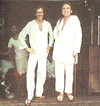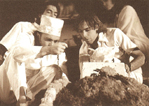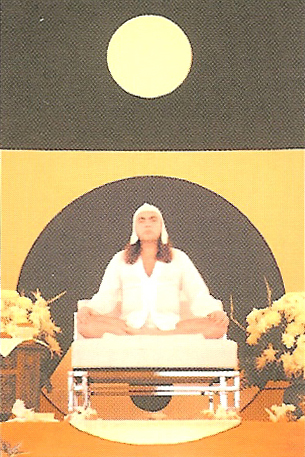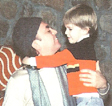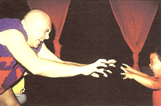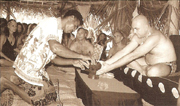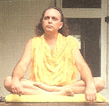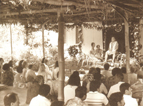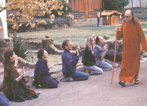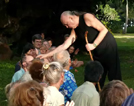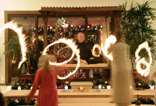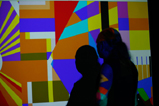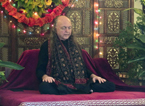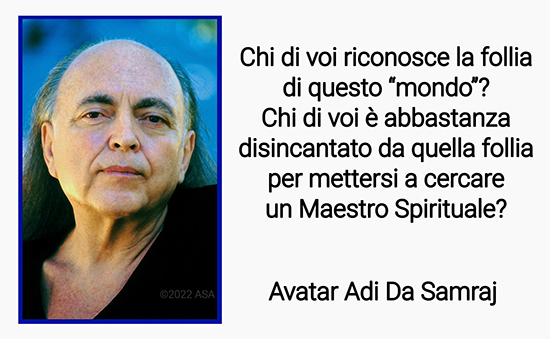Adi Da Up Close
Audio/Video Library
4,371,621 viewings/listens here since our AUDIO/VIDEO LIBRARY opened on Jan. 27, 2009.
(For more, see our graph.)
Our multimedia library currently contains 1,010 YouTube video clips and audio clips about (or related to) Adi Da and Adidam.
[Contains Italian subtitles. If the CC icon ("Subtitles/closed captions") has a red line under it, the subtitles should appear. If you don't see them, just press the CC icon to turn them on.]
"Le formiche hanno un ego" ("Ants have an ego") is a video excerpt from a humorous and profoundly insightful Avataric Discourse (given by Adi Da on October 20, 2004 at Adi Da Samrajashram), Adi Da considers the difference between self-consciousness and egoity, referring to both humans and non-humans (including dogs, ants, and trees).
ADI DA: [Laughs] You generally attribute egoity to human beings, but you wonder about everything else. For instance, what about not something relatively inert like a rug or even just standing there and not seeming to be particularly responsive, like a tree. But what about a dog? Is a dog, do you think dogs are egos when you see them, just as readily as you think of human beings as egos? But, why do you draw the line? I mean how far does it go? Where do you stop thinking of living entities, at least, as egos? Do you just presume everything bigger than a cricket is an ego? Or is everything that moves in your, from your perspective experientially or in your natural presumptions, how far do, does the fact of egoity extend in your presumption.
Well, is an ant an ego in your presumption?
The word “ego” is actually a Greek word which means “I”. I consider it with you and talk about it in terms of self-contraction and so forth, but, so that’s the elaboration on its meaning, but the word simply means “I” which means the reference, self-reference, the reflexive, reflexive pronoun as it’s called of self-reference. So, does an ant feel self-referential?
You observe them protecting themselves and struggling with others. Couldn’t do so without some kind of self-consciousness, could it? So, you naturally presume that even something like an ant is, is a self, an ego, self-aware. Does something have to move from its spatial location? Does it have to be able to take a walk or, such as an ant or a human being, or can a tree? Does a tree have self-consciousness, exhibit self-consciousness. . .
What about trees? They are entities with apparent self-consciousness of a kind. They are in that sense, egos. But are they egoic? Are they functioning egoically? Are they feeling that they are in bondage and moved to seek as human beings are and as you feel in your own case, you see? Trees don’t seem to behave, generally speaking, in quite that way. They are self-conscious as organisms, but they don’t seem to be particularly disturbed about being trees. They seem more characterized by some kind of contemplation in which they don’t feel disturbed.
But if you observe non-humans, virtually all of them show signs of setting themselves apart and entering into a contemplative state that resembles some kind of a samadhi or meditative condition.
Why do you think human beings are disturbed? You see, why is human egoity what it is? If you observe how it appears in evidence in non-humans, suggests that human beings are the way they are because they’re confined, and not just confined by walls and bars. Some people are, and they get very disturbed there, and walk back and forth or get catatonic.
Your bondage is your own activity, and it also extends from conditions. Conditions can reinforce or seem to justify self-contraction. But still what you’re suffering is self-contraction itself.
So, human beings are actually confined, and they are self-confined, and otherwise, also, living in various modes and degrees of confinement by conditions of life and in fact, human beings feel confined by bodily existence, because however healthy you may be at the moment, you know you’re going to die, and are potentially, potentially, you could suffer any number of great happenings. And you anticipate that inevitably, you will, sooner or later, experience some fundamental difficulties that you would prefer not to have to endure, including disease and death.
Well, everything that’s physically living is going to die. The trouble, the difference is does it drive you crazy, make you seek, or are you at ease, because you haven’t lost touch with what transcends that possibility?
Tags: Avataric Discourse Italian

"Le formiche hanno un ego" ("Ants have an ego") is a video excerpt from a humorous and profoundly insightful Avataric Discourse (given by Adi Da on October 20, 2004 at Adi Da Samrajashram), Adi Da considers the difference between self-consciousness and egoity, referring to both humans and non-humans (including dogs, ants, and trees).
ADI DA: [Laughs] You generally attribute egoity to human beings, but you wonder about everything else. For instance, what about not something relatively inert like a rug or even just standing there and not seeming to be particularly responsive, like a tree. But what about a dog? Is a dog, do you think dogs are egos when you see them, just as readily as you think of human beings as egos? But, why do you draw the line? I mean how far does it go? Where do you stop thinking of living entities, at least, as egos? Do you just presume everything bigger than a cricket is an ego? Or is everything that moves in your, from your perspective experientially or in your natural presumptions, how far do, does the fact of egoity extend in your presumption.
Well, is an ant an ego in your presumption?
The word “ego” is actually a Greek word which means “I”. I consider it with you and talk about it in terms of self-contraction and so forth, but, so that’s the elaboration on its meaning, but the word simply means “I” which means the reference, self-reference, the reflexive, reflexive pronoun as it’s called of self-reference. So, does an ant feel self-referential?
You observe them protecting themselves and struggling with others. Couldn’t do so without some kind of self-consciousness, could it? So, you naturally presume that even something like an ant is, is a self, an ego, self-aware. Does something have to move from its spatial location? Does it have to be able to take a walk or, such as an ant or a human being, or can a tree? Does a tree have self-consciousness, exhibit self-consciousness. . .
What about trees? They are entities with apparent self-consciousness of a kind. They are in that sense, egos. But are they egoic? Are they functioning egoically? Are they feeling that they are in bondage and moved to seek as human beings are and as you feel in your own case, you see? Trees don’t seem to behave, generally speaking, in quite that way. They are self-conscious as organisms, but they don’t seem to be particularly disturbed about being trees. They seem more characterized by some kind of contemplation in which they don’t feel disturbed.
But if you observe non-humans, virtually all of them show signs of setting themselves apart and entering into a contemplative state that resembles some kind of a samadhi or meditative condition.
Why do you think human beings are disturbed? You see, why is human egoity what it is? If you observe how it appears in evidence in non-humans, suggests that human beings are the way they are because they’re confined, and not just confined by walls and bars. Some people are, and they get very disturbed there, and walk back and forth or get catatonic.
Your bondage is your own activity, and it also extends from conditions. Conditions can reinforce or seem to justify self-contraction. But still what you’re suffering is self-contraction itself.
So, human beings are actually confined, and they are self-confined, and otherwise, also, living in various modes and degrees of confinement by conditions of life and in fact, human beings feel confined by bodily existence, because however healthy you may be at the moment, you know you’re going to die, and are potentially, potentially, you could suffer any number of great happenings. And you anticipate that inevitably, you will, sooner or later, experience some fundamental difficulties that you would prefer not to have to endure, including disease and death.
Well, everything that’s physically living is going to die. The trouble, the difference is does it drive you crazy, make you seek, or are you at ease, because you haven’t lost touch with what transcends that possibility?
Tags: Avataric Discourse Italian
[Contains Italian subtitles. If the CC icon ("Subtitles/closed captions") has a red line under it, the subtitles should appear. If you don't see them, just press the CC icon to turn them on.]
Un discorso raro e non ancora pubblicato del 1986. Adi Da si rivolge alla primaria emozione umana del dubbio, nel modo piů semplice e diretto.
In 1986, Adi Da made His first visit to the European community of His devotees. He travelled through England, France and Holland. In the South of Holland, in the village of Maria Hoop close to the German border, a former Catholic monastery was found which could be rented for a few weeks. Devotees swiftly cleaned buildings and the grounds. Adi Da stayed in a specially prepared wing of the monastery for several days. During this time, He granted Darshan and held "Question and Answer" occasions in the chapel (now called Adi Da Kapel) with German, English, Dutch, French and American devotees. The former monastery has since been acquired by the European community of Adidam and is now known as The European Danda.
In "Cos'č il Dubbio?" ("What Is Doubt?"), a rare excerpt from one of the "Question and Answer" occasions, Adi Da addresses the primal human emotion of doubt in a most direct and simple manner. He describes how doubt is not ultimately a sign that we have been "betrayed" in some way. The radical solution to doubt is to identify with the Divine Itself, beyond the temporary cycles of the body and mind and beyond the sense of being a separate self.
Tags: Italian

Un discorso raro e non ancora pubblicato del 1986. Adi Da si rivolge alla primaria emozione umana del dubbio, nel modo piů semplice e diretto.
In 1986, Adi Da made His first visit to the European community of His devotees. He travelled through England, France and Holland. In the South of Holland, in the village of Maria Hoop close to the German border, a former Catholic monastery was found which could be rented for a few weeks. Devotees swiftly cleaned buildings and the grounds. Adi Da stayed in a specially prepared wing of the monastery for several days. During this time, He granted Darshan and held "Question and Answer" occasions in the chapel (now called Adi Da Kapel) with German, English, Dutch, French and American devotees. The former monastery has since been acquired by the European community of Adidam and is now known as The European Danda.
In "Cos'č il Dubbio?" ("What Is Doubt?"), a rare excerpt from one of the "Question and Answer" occasions, Adi Da addresses the primal human emotion of doubt in a most direct and simple manner. He describes how doubt is not ultimately a sign that we have been "betrayed" in some way. The radical solution to doubt is to identify with the Divine Itself, beyond the temporary cycles of the body and mind and beyond the sense of being a separate self.
Tags: Italian
[Contains Italian subtitles. If the CC icon ("Subtitles/closed captions") has a red line under it, the subtitles should appear. If you don't see them, just press the CC icon to turn them on.]
Come spiega Adi Da, la pratica spirituale diventa possibile quando la dipendenza e le limitazioni relative alla vita ordinaria sono del tutto chiare e comprese.
In this seminal discourse (at the Mountain Of Attention), from the early years of His Teaching Work, Adi Da speaks about the inevitable process of self-revelation and self-understanding that prepares the being for true Spiritual life.
The full talk is available on the CD, The Grace of Suffering, and on DVD as Volume 2 of the 25th Anniversary DVD Series.
Tags: Italian CD DVD

Come spiega Adi Da, la pratica spirituale diventa possibile quando la dipendenza e le limitazioni relative alla vita ordinaria sono del tutto chiare e comprese.
In this seminal discourse (at the Mountain Of Attention), from the early years of His Teaching Work, Adi Da speaks about the inevitable process of self-revelation and self-understanding that prepares the being for true Spiritual life.
The full talk is available on the CD, The Grace of Suffering, and on DVD as Volume 2 of the 25th Anniversary DVD Series.
Tags: Italian CD DVD
[Contains Italian subtitles. If the CC icon ("Subtitles/closed captions") has a red line under it, the subtitles should appear. If you don't see them, just press the CC icon to turn them on.]
"Quello che Accade Dopo la Morte E' Determinato dal Come Si E' Vissuti" ("What Happens After Death Is Determined By the Way You Live") is published as "After Death, Mind Makes You", in the book, Easy Death. It is from a talk given by Adi Da on December 12, 1988 at Adi Da Samrajashram.
In this sobering discourse, Adi Da speaks of the condition after death in which mind determines one's circumstance, without the limitations of the body, brain and unconsciousness. He addresses the fact that where one's attention is fixed during life affects attention and destiny after life. He recommends that devotees direct their attention to sadhana so that the purification process gives one wisdom that frees one from karmic limitations.
Tags: death Italian
Comments: 1

"Quello che Accade Dopo la Morte E' Determinato dal Come Si E' Vissuti" ("What Happens After Death Is Determined By the Way You Live") is published as "After Death, Mind Makes You", in the book, Easy Death. It is from a talk given by Adi Da on December 12, 1988 at Adi Da Samrajashram.
In this sobering discourse, Adi Da speaks of the condition after death in which mind determines one's circumstance, without the limitations of the body, brain and unconsciousness. He addresses the fact that where one's attention is fixed during life affects attention and destiny after life. He recommends that devotees direct their attention to sadhana so that the purification process gives one wisdom that frees one from karmic limitations.
Tags: death Italian
Comments: 1
[Contains Italian subtitles. If the CC icon ("Subtitles/closed captions") has a red line under it, the subtitles should appear. If you don't see them, just press the CC icon to turn them on.]
In this excerpt from an Avataric Discourse, Adi Da speaks about the necessity to become disillusioned with mortal life in a positive sense. Positive disillusionment is emerging when one begins to understand and relinquish the stressful and ultimately futile search for personal survival, worldly happiness, and ultimate life fulfillment. Only then can one be drawn into recognizing, learning about, and ecstatically participating in Reality Itself, in relationship to a True Realizer.
Tags: Avataric Discourse Italian

In this excerpt from an Avataric Discourse, Adi Da speaks about the necessity to become disillusioned with mortal life in a positive sense. Positive disillusionment is emerging when one begins to understand and relinquish the stressful and ultimately futile search for personal survival, worldly happiness, and ultimate life fulfillment. Only then can one be drawn into recognizing, learning about, and ecstatically participating in Reality Itself, in relationship to a True Realizer.
Tags: Avataric Discourse Italian
[Contains Italian subtitles. If the CC icon ("Subtitles/closed captions") has a red line under it, the subtitles should appear. If you don't see them, just press the CC icon to turn them on.]
This video clip, "L'Insegnamento di Adi Da Come Trasmissione" ("The Teaching of Adi Da as Transmission") includes:
Adi Da: "My Reality-Teaching is unparalleled Spiritual Transmission, occurring under the most extraordinary circumstances. It is not the product of an ordinary mind or a kind of scholarly commentary. It is a direct expression of Spiritual Transformation, of Spiritual Power, of Transcendental, Inherently Spiritual, and (necessarily) Divine Being, Consciousness, and Love-Bliss. It does not arise in Me or through Me in any ordinary fashion. It is an utterly spontaneous and Transcendental Spiritual Event."
For more on how to best make use of Adi Da's Teaching, read the article, The Gift of Study. For more on the Transmission associated with the Teaching, visit our section, The Mantric Force of Adi Da's Word and read our section on Adi Da as Spiritual Transmission Master. For more on Adi Da's unique use of the English language, read our article, Transcendental Orthography as a Teaching Device.
Tags: Avataric Discourse Italian

This video clip, "L'Insegnamento di Adi Da Come Trasmissione" ("The Teaching of Adi Da as Transmission") includes:
- Commentary from Jonathan Condit (at 0:00) — Jonathan Condit was Adi Da's senior editorial assistant, and is Senior Editor for the Adidam Editorial Department. Jonathan talks about "The Function of the Spiritual Literature of Adi Da Samraj", and how Adi Da's Teaching works as Transmission of His Transcendental Spiritual State, and serves the Spiritual Realization of the reader.
- Excerpt from an Avataric Discourse by Adi Da (at 5:35) — The Discourse is "My Teaching is a Direct Transmission of Me", from October 28, 2005. Adi Da talks about how His Teaching Word is a form of Spiritual Transmission, that enables Divine Communion with Him (if the devotee is in the right devotional disposition), in the same way that a Murti photograph does, or any of the other forms of Agency that Adi Da has created for this purpose.
- Commentary from Megan Anderson (at 12:44) — Megan Anderson is an editor in the Adidam Editorial Department. Megan talks about Adi Da's great, final masterpiece, The Aletheon as the purest communication and Transmission of Adi Da Himself (among all His many, extraordinary books), and describes receiving the Revelation of Adi Da as she was proofreading The Aletheon before its publication.
Adi Da: "My Reality-Teaching is unparalleled Spiritual Transmission, occurring under the most extraordinary circumstances. It is not the product of an ordinary mind or a kind of scholarly commentary. It is a direct expression of Spiritual Transformation, of Spiritual Power, of Transcendental, Inherently Spiritual, and (necessarily) Divine Being, Consciousness, and Love-Bliss. It does not arise in Me or through Me in any ordinary fashion. It is an utterly spontaneous and Transcendental Spiritual Event."
For more on how to best make use of Adi Da's Teaching, read the article, The Gift of Study. For more on the Transmission associated with the Teaching, visit our section, The Mantric Force of Adi Da's Word and read our section on Adi Da as Spiritual Transmission Master. For more on Adi Da's unique use of the English language, read our article, Transcendental Orthography as a Teaching Device.
Tags: Avataric Discourse Italian
[Contains Italian subtitles. If the CC icon ("Subtitles/closed captions") has a red line under it, the subtitles should appear. If you don't see them, just press the CC icon to turn them on.]
Per la prima volta in 150 anni di storia, il famoso Museo del Bargello ospita la mostra in solitario di un artista contemporaneo nato negli Stati Uniti: Adi Da Samraj.
Adi Da Samraj creating the Orpheus One and Linead One suites. Accompanied by Adi Da talking about His Image-Art. Edited by Carmen Morrow.
Tags: Orpheus One Linead One Image-Art Italian

Per la prima volta in 150 anni di storia, il famoso Museo del Bargello ospita la mostra in solitario di un artista contemporaneo nato negli Stati Uniti: Adi Da Samraj.
Adi Da Samraj creating the Orpheus One and Linead One suites. Accompanied by Adi Da talking about His Image-Art. Edited by Carmen Morrow.
Tags: Orpheus One Linead One Image-Art Italian
[Contains Italian subtitles. If the CC icon ("Subtitles/closed captions") has a red line under it, the subtitles should appear. If you don't see them, just press the CC icon to turn them on.]
Adi Da critica il cultismo in genere e in particolare quello religioso. Questo discorso, che risale al 1978, č uno dei ricorsi sullo stesso tema che si sono susseguiti negli anni.
Adi Da criticized religious cultism, long before the subject gained any popular attention. (For an audio clip of His earliest criticisms — in June, 1972 — click here.) This discourse, "Cos'č il Cultismo?" ("What Is Cultism?"), given in 1978 at The Mountain Of Attention, is one of His summary addresses on the subject. Adi Da observes that the primary characteristic of a cult member is shared enthusiasm (like enjoying the energy of the crowd at a football game). For example, in "the cult of the Spiritual Master", everybody is enjoying the enthusiasm (their own and each other's) associated with having "found" the great Master; but no one is actually engaged in significant deepening of the devotional and spiritual relationship with the Master, and practicing on that basis — hence no Spiritual growth or Realization occurs.
Adi Da: "My purpose in My Teaching is to make it possible for you to duplicate what I have done — not to be eternally separated from Me, but to be in Communion with Me — to be intimate with Me in Spiritual terms, so that you, yourself, may live this practice, and fulfill it in your own case."
Tags: Italian

Adi Da critica il cultismo in genere e in particolare quello religioso. Questo discorso, che risale al 1978, č uno dei ricorsi sullo stesso tema che si sono susseguiti negli anni.
Adi Da criticized religious cultism, long before the subject gained any popular attention. (For an audio clip of His earliest criticisms — in June, 1972 — click here.) This discourse, "Cos'č il Cultismo?" ("What Is Cultism?"), given in 1978 at The Mountain Of Attention, is one of His summary addresses on the subject. Adi Da observes that the primary characteristic of a cult member is shared enthusiasm (like enjoying the energy of the crowd at a football game). For example, in "the cult of the Spiritual Master", everybody is enjoying the enthusiasm (their own and each other's) associated with having "found" the great Master; but no one is actually engaged in significant deepening of the devotional and spiritual relationship with the Master, and practicing on that basis — hence no Spiritual growth or Realization occurs.
Adi Da: "My purpose in My Teaching is to make it possible for you to duplicate what I have done — not to be eternally separated from Me, but to be in Communion with Me — to be intimate with Me in Spiritual terms, so that you, yourself, may live this practice, and fulfill it in your own case."
Tags: Italian
[Contains Italian subtitles. If the CC icon ("Subtitles/closed captions") has a red line under it, the subtitles should appear. If you don't see them, just press the CC icon to turn them on.]
Gerald Sheinfeld, un devoto di Avatar Adi Da sin dai primi anni 70, ci racconta la magnifica storia dell'incontro col suo Maestro, Adi Da Samraj, e del suo immediato riconoscere in Adi Da la singolaritŕ del Suo stato di Felicitŕ e Liberazione. Gerald parla anche del modo in cui il riconoscere Adi Da risvegli implicitamente il nostro stesso stato di Unitŕ-a-priori.
Gerald Sheinfeld, a devotee of Avatar Adi Da since the early 1970's, tells a wonderful story about how he found his Guru, Adi Da Samraj and his immediate recognition of Adi Da's unique state of Freedom, Happiness, and Liberation. Gerald speaks about how that recognition of Adi Da has the capacity to awaken others to that state of Prior Unity.
Gerald tells many more stories of his life of more than 45 years with Adi Da in his book, At the Feet of the Spiritual Master. Some of these stories are also available in audio form on his downloadable album, At the Feet of the Spiritual Master.
Tags: DVD CD Italian

Gerald Sheinfeld, un devoto di Avatar Adi Da sin dai primi anni 70, ci racconta la magnifica storia dell'incontro col suo Maestro, Adi Da Samraj, e del suo immediato riconoscere in Adi Da la singolaritŕ del Suo stato di Felicitŕ e Liberazione. Gerald parla anche del modo in cui il riconoscere Adi Da risvegli implicitamente il nostro stesso stato di Unitŕ-a-priori.
Gerald Sheinfeld, a devotee of Avatar Adi Da since the early 1970's, tells a wonderful story about how he found his Guru, Adi Da Samraj and his immediate recognition of Adi Da's unique state of Freedom, Happiness, and Liberation. Gerald speaks about how that recognition of Adi Da has the capacity to awaken others to that state of Prior Unity.
Gerald tells many more stories of his life of more than 45 years with Adi Da in his book, At the Feet of the Spiritual Master. Some of these stories are also available in audio form on his downloadable album, At the Feet of the Spiritual Master.
Tags: DVD CD Italian
[Contains Italian subtitles. If the CC icon ("Subtitles/closed captions") has a red line under it, the subtitles should appear. If you don't see them, just press the CC icon to turn them on.]
Adi Da spiega il perché religioni convenzionali e avvicinamenti spirituali non riescono a Realizzare pienamente il Divino.
"L'Essenza nella Via di Adidam" ("The Essence of the Way of Adidam") is an excerpt from an Avataric Discourse given by Adi Da at Adi Da Samrajashram on April 12, 2004.
Adi Da describes why conventional religious and spiritual approaches fail to fully realize the Divine. He then summarizes, in a simple way, the practice He offers: the Reality-Way of Adidam.
Tags: Avataric Discourse Italian
Comments: 1

Adi Da spiega il perché religioni convenzionali e avvicinamenti spirituali non riescono a Realizzare pienamente il Divino.
"L'Essenza nella Via di Adidam" ("The Essence of the Way of Adidam") is an excerpt from an Avataric Discourse given by Adi Da at Adi Da Samrajashram on April 12, 2004.
Adi Da describes why conventional religious and spiritual approaches fail to fully realize the Divine. He then summarizes, in a simple way, the practice He offers: the Reality-Way of Adidam.
Tags: Avataric Discourse Italian
Comments: 1
[Contains Italian subtitles. If the CC icon ("Subtitles/closed captions") has a red line under it, the subtitles should appear. If you don't see them, just press the CC icon to turn them on.]
"Unitŕ Umana" ("The Unity of Humankind") is an excerpt from the Avataric Discourse of August 22, 2004.
Adi Da describes how humankind is a single family, a single species in "diaspora" — dispersed across the earth as the result of migrations from a single point of origin (in Africa) thousands of years ago. Making much of superficial differences due to race, nation, religion, language, tribe, political system, etc. obscures this more fundamental, deeper reality of the unity of humankind. For the sake of everyone's survival, humankind must begin to live on the basis of its unity, and establish a global cooperative order that includes and serves everyone.
Tags: Italian Avataric Discourse

"Unitŕ Umana" ("The Unity of Humankind") is an excerpt from the Avataric Discourse of August 22, 2004.
Adi Da describes how humankind is a single family, a single species in "diaspora" — dispersed across the earth as the result of migrations from a single point of origin (in Africa) thousands of years ago. Making much of superficial differences due to race, nation, religion, language, tribe, political system, etc. obscures this more fundamental, deeper reality of the unity of humankind. For the sake of everyone's survival, humankind must begin to live on the basis of its unity, and establish a global cooperative order that includes and serves everyone.
Tags: Italian Avataric Discourse
[Contains Italian subtitles. If the CC icon ("Subtitles/closed captions") has a red line under it, the subtitles should appear. If you don't see them, just press the CC icon to turn them on.]
L'Arte di Adi Da Samraj ("The Art of Adi Da Samraj") is a retrospective of Adi Da's monumental size image-art. It includes clips of Him talking about His work. It also includes slides from various exhibitions and some quotes about Adi Da's art from an art critic, an art historian, and a museum curator.
Soundtrack:
* Adi Da speaking about "point of view" and "no point of view".
* a piece by Tamarind Free Jones (composer, singer).
* Ray Lynch, Celestial Soda Pop, from Deep Breakfast.
* a piece from the album, Baba Da's Great Tradition Improvisation Fusion Orchestra
* Antonio Vivaldi, The Four Seasons
Tags: Image-Art Italian

L'Arte di Adi Da Samraj ("The Art of Adi Da Samraj") is a retrospective of Adi Da's monumental size image-art. It includes clips of Him talking about His work. It also includes slides from various exhibitions and some quotes about Adi Da's art from an art critic, an art historian, and a museum curator.
Soundtrack:
* Adi Da speaking about "point of view" and "no point of view".
* a piece by Tamarind Free Jones (composer, singer).
* Ray Lynch, Celestial Soda Pop, from Deep Breakfast.
* a piece from the album, Baba Da's Great Tradition Improvisation Fusion Orchestra
* Antonio Vivaldi, The Four Seasons
Tags: Image-Art Italian
[Contains Italian subtitles. If the CC icon ("Subtitles/closed captions") has a red line under it, the subtitles should appear. If you don't see them, just press the CC icon to turn them on.]
In this video clip from the 1988 talk, "What Is Your Intention?", Adi Da criticizes the "do-it-yourself" approach to spirituality that is popular in the world today, and speaks about why a teacher is necessary.
Adi Da reminds us that, historically, all the world's spiritual traditions have taught that Spiritual Realization requires the help of a Spiritual Realizer. This is actually built into the laws of how Spiritual Realization works, and can't be changed just because times and cultures change, just because we don't happen to like the way the laws work or what they require of us, etc. For this reason, Adi Da makes the point that, nowadays, our resistence to authority, and addiction to "do it yourself" approaches, represent unfortunate hindrances to our own Spiritual growth: if we simply go with the flow and let these culturally instilled programs dominate our life choices, they will keep us from Realizing our greatest destiny.
The full talk is available on the DVD, The Commitment To Real-God-Realization.
For more on this subject, read our article, Why Great Spiritual Realization Requires a Spiritual Transmission Master.
Tags: DVD Italian
Comments: 2

In this video clip from the 1988 talk, "What Is Your Intention?", Adi Da criticizes the "do-it-yourself" approach to spirituality that is popular in the world today, and speaks about why a teacher is necessary.
Adi Da reminds us that, historically, all the world's spiritual traditions have taught that Spiritual Realization requires the help of a Spiritual Realizer. This is actually built into the laws of how Spiritual Realization works, and can't be changed just because times and cultures change, just because we don't happen to like the way the laws work or what they require of us, etc. For this reason, Adi Da makes the point that, nowadays, our resistence to authority, and addiction to "do it yourself" approaches, represent unfortunate hindrances to our own Spiritual growth: if we simply go with the flow and let these culturally instilled programs dominate our life choices, they will keep us from Realizing our greatest destiny.
The full talk is available on the DVD, The Commitment To Real-God-Realization.
For more on this subject, read our article, Why Great Spiritual Realization Requires a Spiritual Transmission Master.
Tags: DVD Italian
Comments: 2
[Contains Italian subtitles. If the CC icon ("Subtitles/closed captions") has a red line under it, the subtitles should appear. If you don't see them, just press the CC icon to turn them on.]
Questo č il canale che celebra Adi Da Samraj – realizzatore spirituale unico, maestro, autore e artista. Adi Da Samraj ha dedicato la sua vita alla creazione di strumenti utili all'umanitŕ per realizzare la Veritŕ ultima – quello che lui ha chiamato il “Luminoso”, ossia la Indivisibile Realtŕ in cui noi tutti appariamo.
Per ulteriori informazioni su Adi Da Samraj, si prega di scrivere a: videodidida@gmail.com.
In "Il lavoro di Adi Da Samraj" ("The Work of Adi Da Samraj"), longtime devotee and Adidam educator, Anthony Costabile, summarizes the purpose of Adi Da's lifetime succinctly, and describes how the practice given by Adi Da authenticates itself.
For more about Adi Da's Teaching, click here.
For more about Adi Da's Spiritual Transmission of Divine Enlightenment, click here.
For more about Adi Da's Work with human beings after His lifetime, click here.
For more about how Adi Da made the Offering of Adidam available for all beings for all time, click here.
Tags: Italian

Questo č il canale che celebra Adi Da Samraj – realizzatore spirituale unico, maestro, autore e artista. Adi Da Samraj ha dedicato la sua vita alla creazione di strumenti utili all'umanitŕ per realizzare la Veritŕ ultima – quello che lui ha chiamato il “Luminoso”, ossia la Indivisibile Realtŕ in cui noi tutti appariamo.
Per ulteriori informazioni su Adi Da Samraj, si prega di scrivere a: videodidida@gmail.com.
In "Il lavoro di Adi Da Samraj" ("The Work of Adi Da Samraj"), longtime devotee and Adidam educator, Anthony Costabile, summarizes the purpose of Adi Da's lifetime succinctly, and describes how the practice given by Adi Da authenticates itself.
For more about Adi Da's Teaching, click here.
For more about Adi Da's Spiritual Transmission of Divine Enlightenment, click here.
For more about Adi Da's Work with human beings after His lifetime, click here.
For more about how Adi Da made the Offering of Adidam available for all beings for all time, click here.
Tags: Italian
Questo č il canale che celebra Adi Da Samraj – realizzatore spirituale unico, maestro, autore e artista. Adi Da Samraj ha dedicato la sua vita alla creazione di strumenti utili all'umanitŕ per realizzare la Veritŕ ultima – quello che lui ha chiamato il “Luminoso”, ossia la Indivisibile Realtŕ in cui noi tutti appariamo.
Per ulteriori informazioni su Adi Da Samraj, si prega di scrivere a: videodidida@gmail.com.
Tags: Italian Darshan Mountain Of Attention

Per ulteriori informazioni su Adi Da Samraj, si prega di scrivere a: videodidida@gmail.com.
Tags: Italian Darshan Mountain Of Attention







